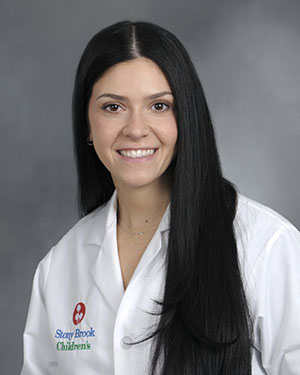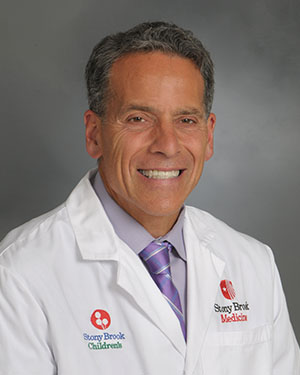Navigation Healthy Weight and Wellness Center
Healthy Weight and Wellness Center
Obesity is one of the next generation’s most pressing health problems. It has more than doubled in children and tripled in adolescents in the past 30 years nationwide. Long Island is no exception to this trend. The Healthy Weight and Wellness Center was designed to support parents and children in addressing this health trend.
Bringing together the expertise and resources of Suffolk County's only academic medical center, the Center’s primary mission is to help children and adolescents 21 years of age and younger. Our positive, family-friendly, evidence-based approach is individualized to each patient and delivered by a multidisciplinary team using the expertise and resources of Suffolk County’s only academic medical center.
We serve as an information resource to Long Island through public education programs and close collaboration with community health providers. We also work to advance obesity research, identify information gaps, and apply essential statistics in an effort to improve obesity prevention and treatment.
All of these elements contribute to positive outcomes, prevention, and advances in understanding obesity as we strive to help our young people attain and maintain optimal weight and achieve a healthier future.
Services
A physician and a registered dietician conduct a detailed intake evaluation with appropriate medical screenings, including assessment with full body composition analyzer, for health issues common to obesity. Our full body composition analyzer uses multi-frequency technology in calculating body composition measurements, ensuring precise results. In addition to the weight, fat mass and fat percentage are calculated in children under 18 years old. For 18 years old and over patients, additional information of muscle mass, bone mass, and segmental analysis of trunk, arms and legs are obtained.
Assessments and behavior modification plans continue periodically. We counsel based on motivational interviewing, where the family and patient take part in goal-setting for their therapy. If medical conditions are suspected, our pediatric sub-specialists provide consultation as needed.
Nutritional counseling is a major part of our plan of action. Helping patients and their families understand the importance of healthy eating and the effects of food on their health can motivate them to make better food choices throughout their lives. We start by having most patients meet with our registered dietitians. Together, they review the patient’s diet, analyze nutrient intake and develop an individualized eating plan. We work with the family to provide education on meal planning, label reading, food choices, and recipe modifications.
Obesity is a chronic disease and should be treated with intensive and long-term care strategies, ongoing medical monitoring and treatment of associated comorbidities. Although dietary changes and lifestyle changes have the largest body of evidence as treatment for obesity, it is important to consider the use of medication for children and adolescents who require an additional treatment option to manage their obesity. In our Healthy Weight and Wellness Clinic, we offer weight loss medications as an aid to patients that have made dietary and lifestyle changes but are not seeing improvement in their health despite their efforts. We stress that medication should only be used in conjunction with diet and lifestyle changes.
Led by board-certified physicians who are leaders in Bariatric, Foregut, and Advanced GI surgery, Stony Brook offers safe and effective bariatric surgical options for adolescents who qualify that can be tailored to their individual weight loss needs. We are ranked among the top centers nationally for bariatric surgery patient outcomes reported to the MBSAQIP (Metabolic and Bariatric Surgery Accreditation and QI program).
Learn more about bariatric surgery options or call (631) 444-BARI (2274).
Our Team
Compassionate and committed to your child’s health, our team consists of a board-certified pediatrician and a registered dietitian. Often, obesity is associated with other medical conditions. Supporting specialists can become part of your child’s healthcare team as needed. In addition, we work with Stony Brook’s renowned bariatric team to treat older adolescents who are considering a bariatric surgical procedure.



Contact Us
If you think your child could benefit from the Healthy Weight and Wellness Center, talk to your primary care physician about obtaining a referral to the program. We are happy to answer your questions at any time.
Please call (631) 444-KIDS (5437) or (631) 444-2730.
Your Appointment
Lifelong health and wellness starts with establishing healthy habits. At our Healthy Weight and Wellness Clinic, our team of specialists, including physicians and dietitians, work with your child and your family to establish changes that work with your lifestyle.
Please arrive 15 minutes before your scheduled appointment time. Bring your child’s insurance card as well. You will be asked to fill out a two-page initial questionnaire asking about your child’s medical history and questions about your child’s habits. You can also print and fill out the questionnaire before the appointment and bring it in with you on your first visit.
Please call if you are running late. We may ask you to reschedule as we do not want to rush through your appointment. Understanding our patients, medical and lifestyle evaluation, and providing individualized care geared to each individual takes time.
Your child’s vitals will be taken along with a comprehensive body analysis using our bioelectric impedance scale, which measures fat percentage. If your child is over 18 years old, the scale also provides calculations for fat, muscle, bone, and water mass, visceral fat, basal metabolic rate, and a unique metabolic age assessment.
During your child’s first appointment, your child’s team will ask many questions to understand the different factors that may be contributing to the abnormal weight gain. Your child will meet with a physician and dietitian. We’ll also assess for other comorbidities associated with excessive weight gain, such as diabetes, high blood pressure, high cholesterol, high triglyceride, fatty liver, sleep apnea, and many others.
We will explore if there are mental or emotional health issues that may be affecting your child’s habits. Many children struggle with anxiety and depression that is not diagnosed or addressed yet, which can be a big contributor to unhealthy weight gain.
A dietician will also discuss current eating and exercise habits. They will make recommendations of what changes can be made. However it is overwhelming when one asks for lots of changes at a time. So your child will pick at least 2 goals to start with and work on those until their next appointment. Individualized achievable goals lead to motivation and are more likely to succeed.
You will receive a binder with handouts to review at home to reinforce what was discussed at the appointment.
This initial appointment will typically be 1-1.5 hours. A follow-up appointment will be scheduled before you leave. Most follow-ups occur 2 months after the initial visit. Research has shown that patients with close follow-up and intensive counseling are most successful at achieving a healthy weight and lifestyle.
Your child may be referred to another specialist to address any underlying health conditions identified during the visit. Stony Brook Children’s Hospital has many pediatric subspecialties, including endocrinology and sleep medicine specialists, to help take care of your child.
Your child will require multiple visits towards achieving a healthy weight as habits are hard to break, and new habits are hard to form. A comprehensive body analysis will be obtained to see if there is any reduction in fat percentage since weight may be the same if more muscle mass is gained through a healthy lifestyle of diet and exercise. You will meet with a physician and dietician at every visit. We will assess if there are new issues at every visit and address new concerns.
If diet and exercise have been optimized, and your child continues to gain weight, we will discuss whether medical management, such as weight loss medication, is warranted. We will also discuss the safety and appropriateness of medical therapy at length.
The Healthy Weight and Wellness Clinic works with our Bariatric Program, which is accredited at the highest level by the Metabolic and Bariatric Surgery Accreditation and Quality Improvement Program (MBSAQIP) to work with adolescents. We are ranked among the top centers nationally for bariatric surgery patient outcomes reported to the MBSAQIP.
Parental participation and support are most important for your child’s (and your family’s) journey to a healthy weight and general wellness. We will be there to support you and your child every step of the way. Most importantly, we take pride in listening to each child’s and their family’s needs to determine the best-individualized changes and goals that would work for you.
Frequently Asked Questions
Being overweight or obese is not just a matter of a few extra pounds. They are clinically defined health conditions deserving evidence-based, effective treatment. As defined by the Centers for Disease Control (CDC), obesity is recognized when a child’s Body Mass Index (BMI) is at or above the 95th percentile for children and teens of the same age and sex.
Our program focuses on children and adolescents ages 5 to 18 whose BMI is equal to or greater than the 95th percentile. We also treat children and teens considered overweight— those whose BMI is between the 85th and 95th percentile—if they have weight-related medical conditions such as high cholesterol, high blood pressure, or pre-diabetes.
Talk to your child’s physician about your child’s BMI percentile. You can also visit this link at the CDC website to calculate your child’s BMI: Child and Teen BMI Calculator | BMI | CDC.
When more calories are taken in than the body can use, the unused calories are stored as fat. When this occurs repeatedly over time, obesity can develop. Many factors come into play: overeating and a poor diet, lack of exercise, medical issues such as endocrine or neurological problems, medications such as steroids and certain psychiatric drugs, depression or emotional problems, family and social stressors, or a family history of obesity.
Our culture plays a role, too. The prevalence of fast food, enlarged portions, and inactive forms of entertainment (television, computers, cell phones) contribute to the rise in obesity across America.
The consequences of pediatric obesity can include:
- High blood pressure
- High cholesterol
- Diabetes
- Joint pain
- Sleep apnea
- Stigmatization
- Poor self-esteem
- Depression
- Anxiety
When a child diagnosed with obesity as a chronic condition grows up to become an adult with obesity, the risk of related health problems only escalates. The health risks for adults with obesity include all of the conditions listed above, plus heart disease, stroke, several types of cancer, infertility, osteoarthritis and other issues.



